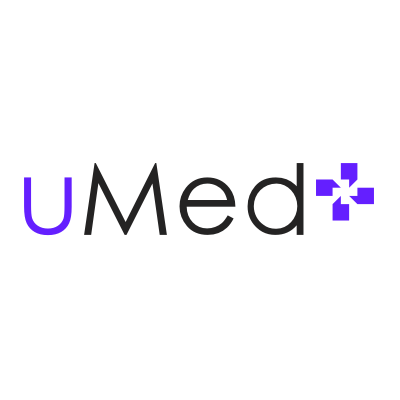
A catch up with Dr Matt Wilson, Founder of uMed
COVID-19 has shown the power of clinical trials. It took less than 300 days for one vaccine to go from being an idea in a lab to be ready for administering to the general public. The question now is how we can accelerate clinical trials for other diseases, at a time when the healthcare industry is stretched and doesn’t have the capacity to run patient research at the speed or scale that’s needed.
Here, we caught up with Dr Matt Wilson, Founder and CEO of research automation platform, uMed, who is on a mission to help more healthcare providers and their patients take part in clinical studies.
Tell me about your startup and what you do?
uMed is a research technology platform. Founded in 2018, it helps healthcare providers run patient research more efficiently and at scale. It does this by automating the processes required to build groups or ‘cohorts’ of patients which usually demand laborious, manual hours.
It means providers from GPs to hospitals can participate in dozens of programmes simultaneously without increasing their overhead or burden on staff. The effect is they can focus on providing clinical care to their patients, while patients can participate in many more studies from home with full transparency over the use of their health records.

The platform also enables researchers involved in clinical studies to access regulator quality data to target potential participants, then repeatedly reach back to those patients on behalf of the healthcare provider. This means data in the record can be combined with high quality, structured data, captured from the patient at home but without the burden on local healthcare provider staff.
Where did the idea come from?
As a former A&E doctor, anaesthetist, and Royal Marines medical officer, I know what clinicians are up against just in delivering patient care. When on shifts in the emergency department, we would sometimes go 14 hours without eating anything, so the idea of doing research in these situations is simply unrealistic.
The pandemic has made things worse. When I went back into clinical practice to support my local intensive care unit in the first wave of the virus last spring, I noticed operations that would take ten minutes were now taking up to an hour with all the PPE protocols, the cleansing of work stations, deployment of anti-viral vapours and that fact that some clinicians were also at too high risk for infection themselves to go into Covid wards. The time window for clinicians to undertake the meticulous, manual tasks associated with studies is just not there, so activity that could yield advances for treatments is lost.
It’s this experience that led me to focusing on finding ways to automate clinical research that could short-circuit bureaucratic processes to build groups of patients that would accelerate studies. The thing that started to crystallise for me is that, if you want to do something serious with health data, you need to be able to reach back to the patient. That changes everything if you can do it. Crucially, you can gain patient consent as well as validate and augment data that exists in the health record. And this is how uMed was born.
What technology is involved?
uMed is a software solution that works in three stages:
- Our platform integrates with the healthcare provider’s Electronic Health Record (EMR) to match eligible patients to studies that are sourced by uMed or internal research teams.
- The approval of the programs via the uMed dashboard triggers the automated outreach and remote consent of those patients on behalf of their recognised provider.
- uMed remotely captures data from both the patient, the EHR and where necessary the clinician, linking this data back to the study dataset in a seamless process that maintains robust guarding of patient data, provider oversight and a safe patient experience.
What is the main goal?
Our mission is to remove the roadblocks to getting clinical studies that are lifechanging to patients off the shelf and into the world at speed. Most GPs simply don’t have enough capacity which means clinical studies, although vital, often come second to delivering immediate patient outcomes.
Sadly, many clinical trials fail before they have even begun. Since March 2020, around 1,000 organisations supporting clinical trials have delayed the initiation of planned trials or withdrawn them completely, suspended enrolment in ongoing trials, or terminated these trials.
Slow enrolment is largely to blame, with researchers struggling to recruit patients as volunteers. After all, without the volunteers to take part in clinical trials, there could be almost no research, which means it would be impossible to know which treatments are safe, let alone effective.
By automating the study processes, we can help healthcare providers take part in vital health research, and at pace. We take on all the heavy lifting, from matching target cohorts of patients with clinical research opportunities through to engaging patients on behalf of the health system through an automated platform. What’s more, we collate the datasets for reporting while safeguarding patient data and ensuring regulatory compliance.
What makes your business different from others?
Many other companies only have access to aggregated pseudonymised data, which means they cannot centrally re-engage patients and have no option but to rely on staff at sites to communicate with patients. What’s more, they don’t have the mechanism to use the data they have ‘in-trial’ as deidentified records cannot be linked back to study subjects.
Our technology, on the other hand, is uniquely able to reach back compliantly from the Electronic Health Record (EHR) to the patients, which means the process for building research registries can be heavily automated and healthcare providers can re-engage with patients.
What has your funding journey been like so far?
We’ve enjoyed great success throughout our funding journey so far. We raised £3.7m in venture capital during our latest funding round last November, which has enabled us to grow our platform and expand our presence into the US.
We’re backed by AlbionVC, Delin Ventures and Playfair Capital, along with Silicon Valley’s 11.2 Capital – who all continue to show enthusiasm for uMed, recognising that we have developed a powerful platform that can link some of the richest sources of healthcare data and drive a step change in how clinical and real-world research is conducted.
What have some of the biggest challenges been so far?
uMed is founded on an extremely robust privacy model that ensures healthcare providers and patients are always in control of how their health record data is used. Even so, when uMed was getting started, it was a big challenge to ensure all stakeholders were bought into this model, which is even harder when you are startup without a track record.
Our approach from the get go was to build that trust through transparency. There is a tangible scepticism of health technology among many in healthcare, which has been driven by the hubris and hyperbole emanating from young companies that have then failed to deliver. At uMed, we have always been transparent with our healthcare partners, life science clients and patients which has been key in allowing us to overcome these barriers to entry.
What do you have planned for the future?
In short, further expansion in both the UK and US. Since we launched in 2012, we have embedded across a rapidly expanding global network that includes more than two million patients in over 200 primary care sites in the UK and soon to include several US health systems.
Our priority is to continue to connect life science researchers with healthcare providers and their patients, so we can call better understand diseases and discover new treatments that will benefit patients.
We are also beginning to run our own studies which follow specific groups of patients over time so that, with patient consent, we can link data in their health record to other data captures from the patient at home include genomic samples and questionnaires. These ‘registry’ studies have the power to transform the way new treatment targets are identified and then developed. We’re aiming to launch the first of these in Q4 2021, so watch this space.


